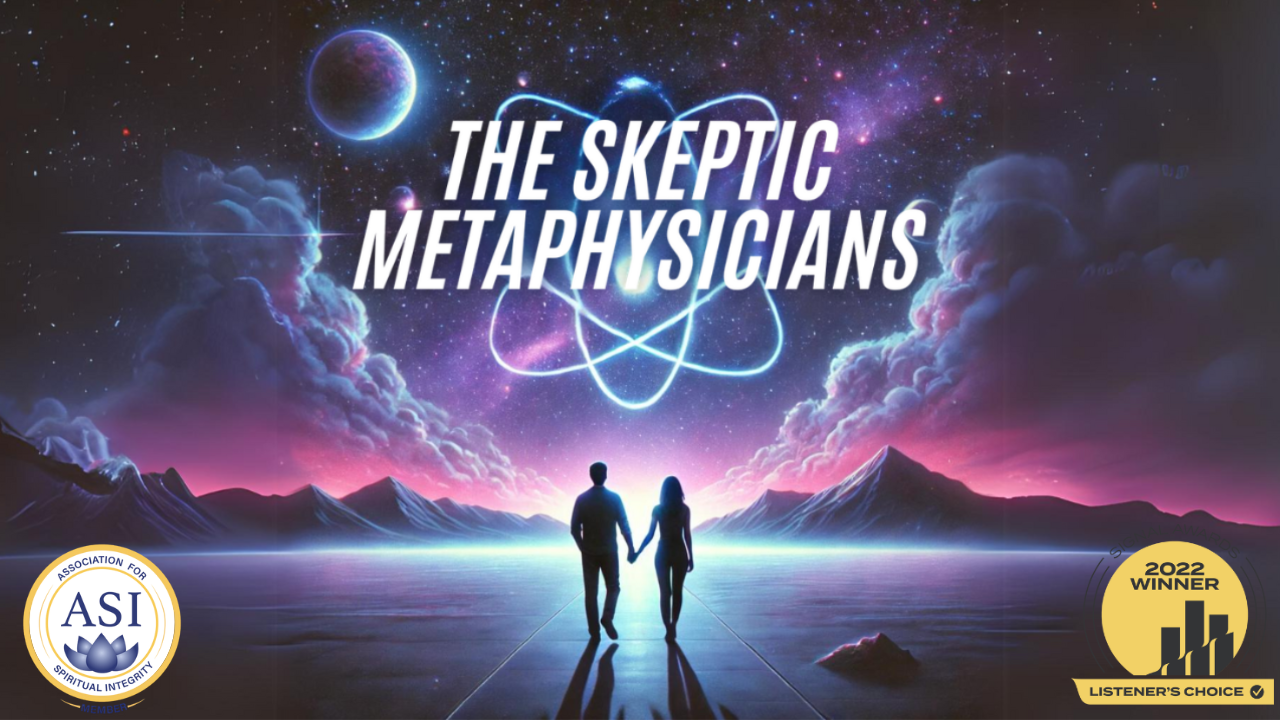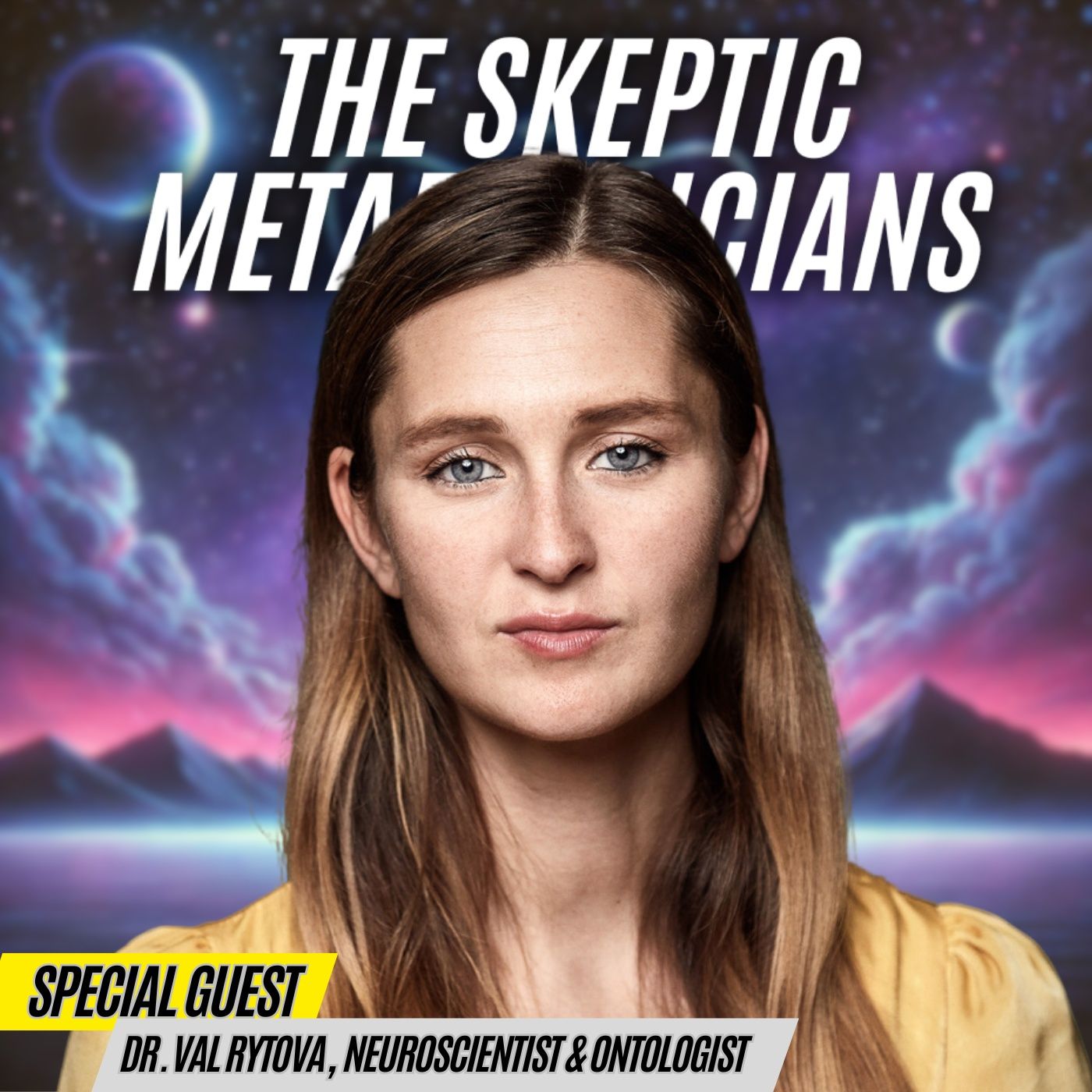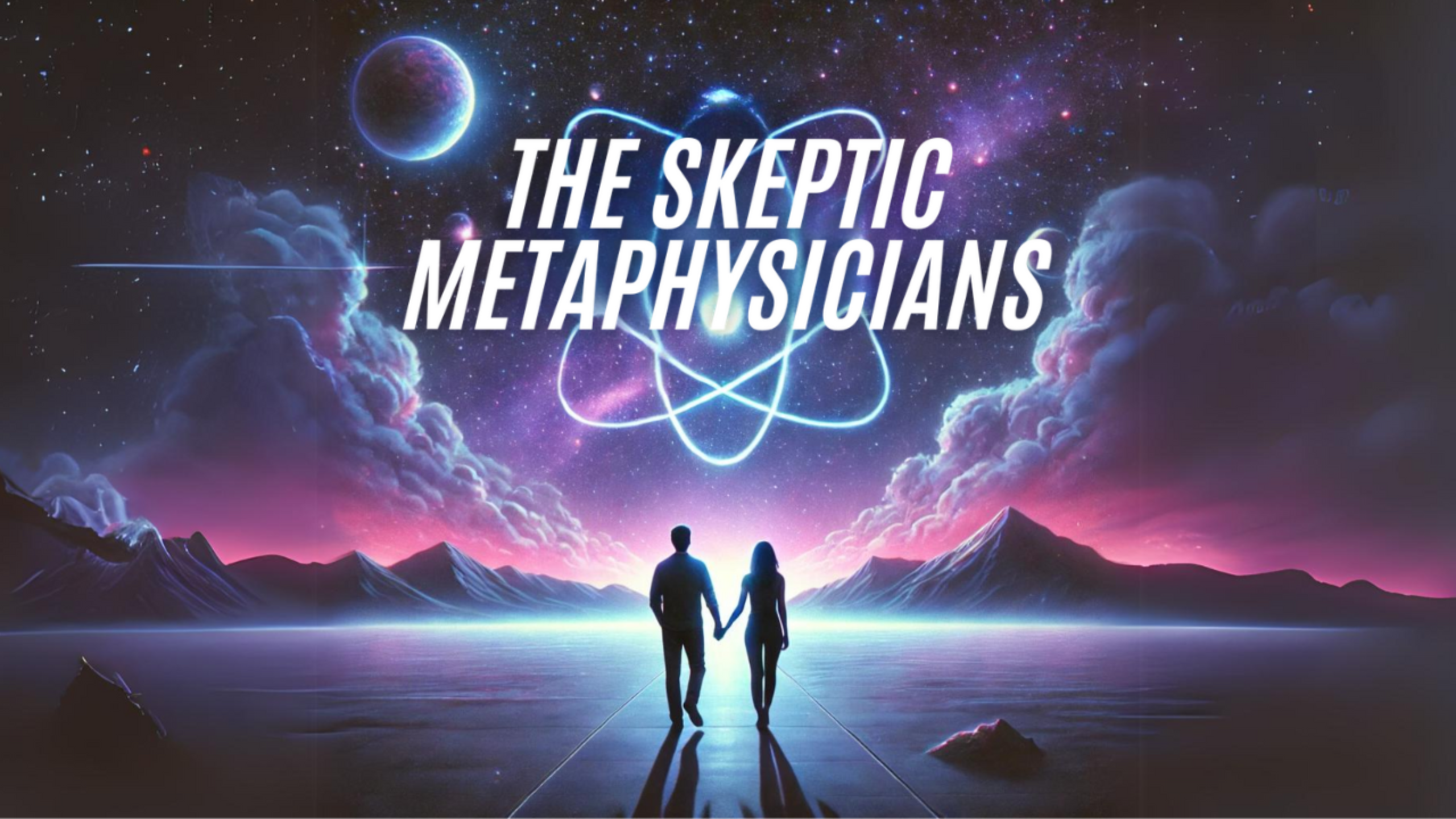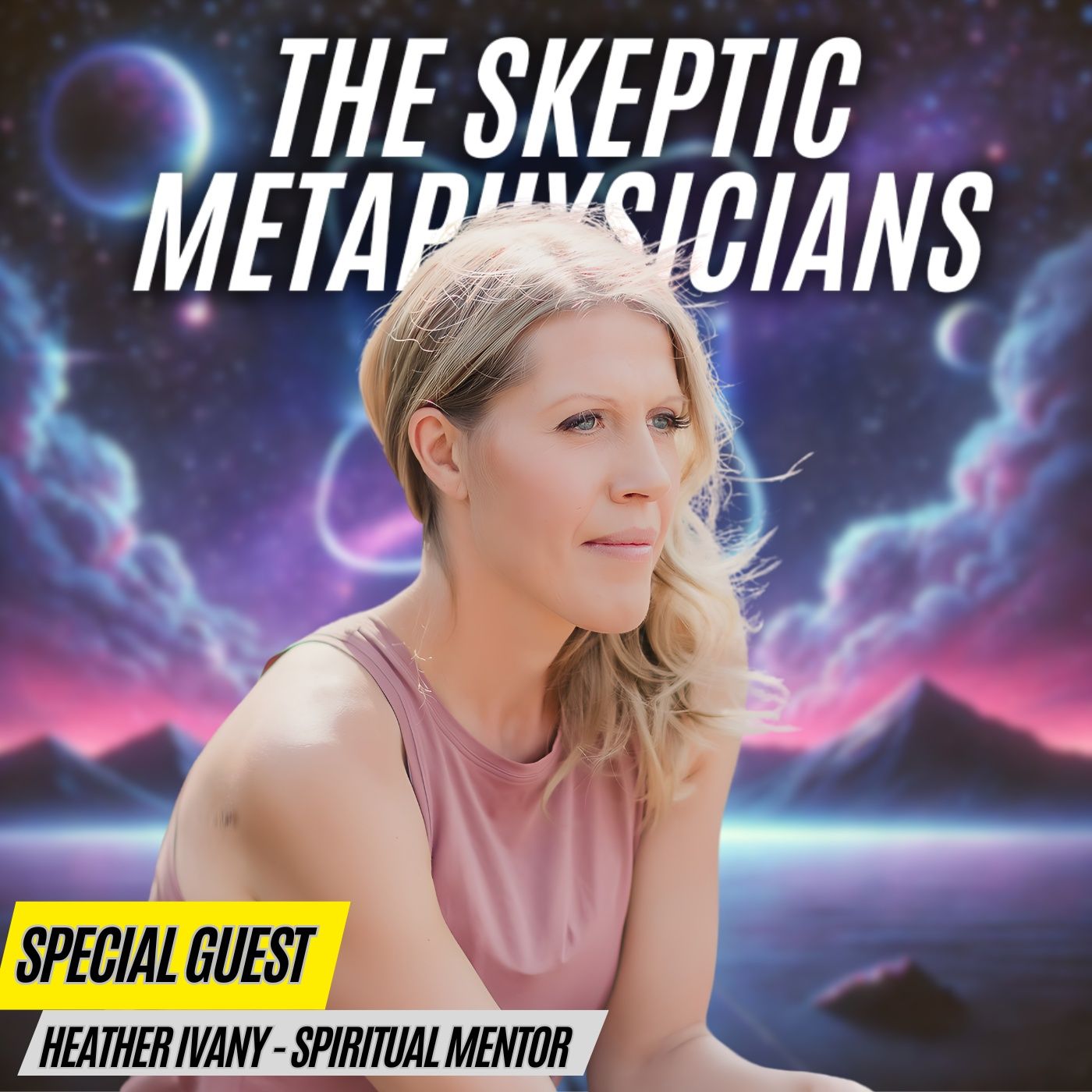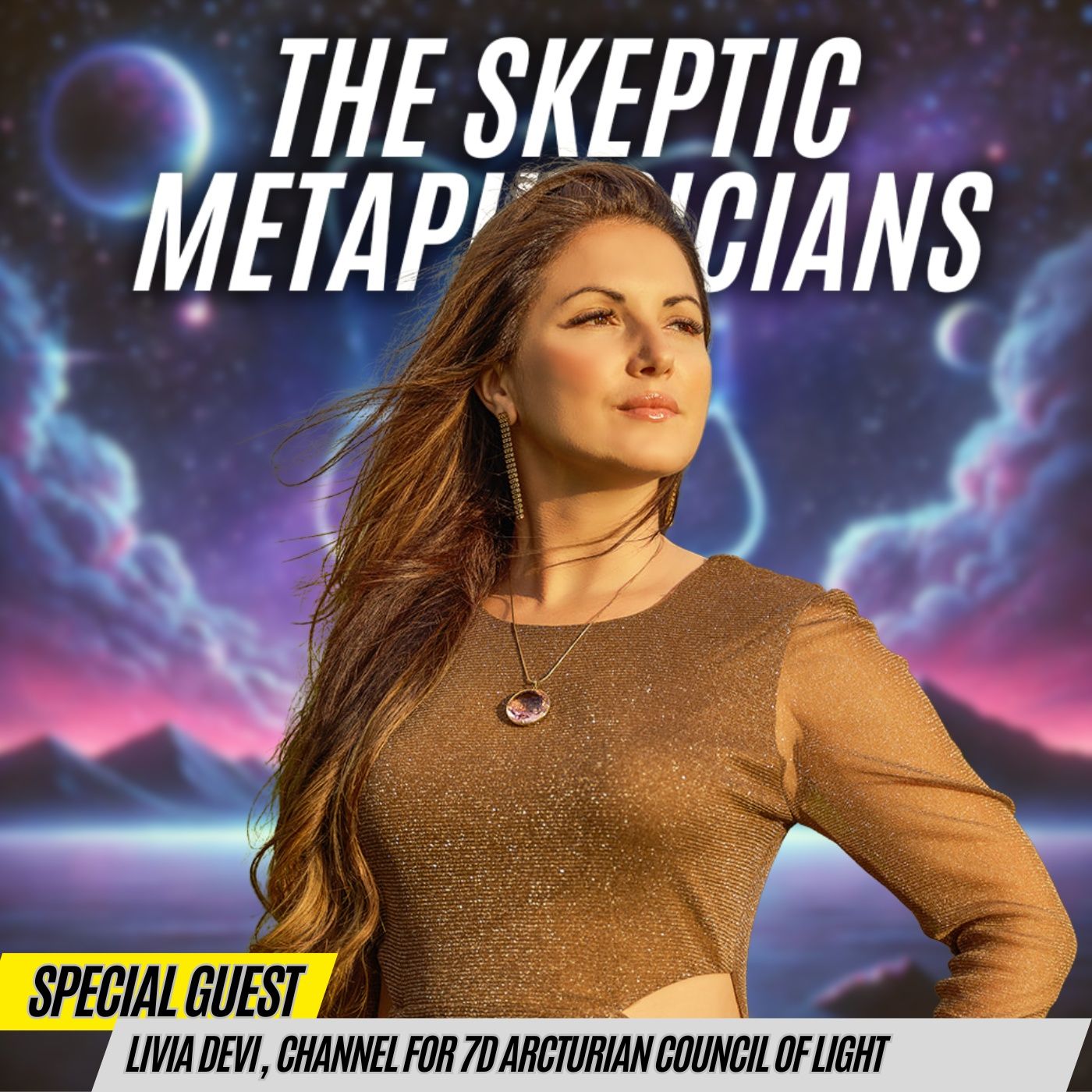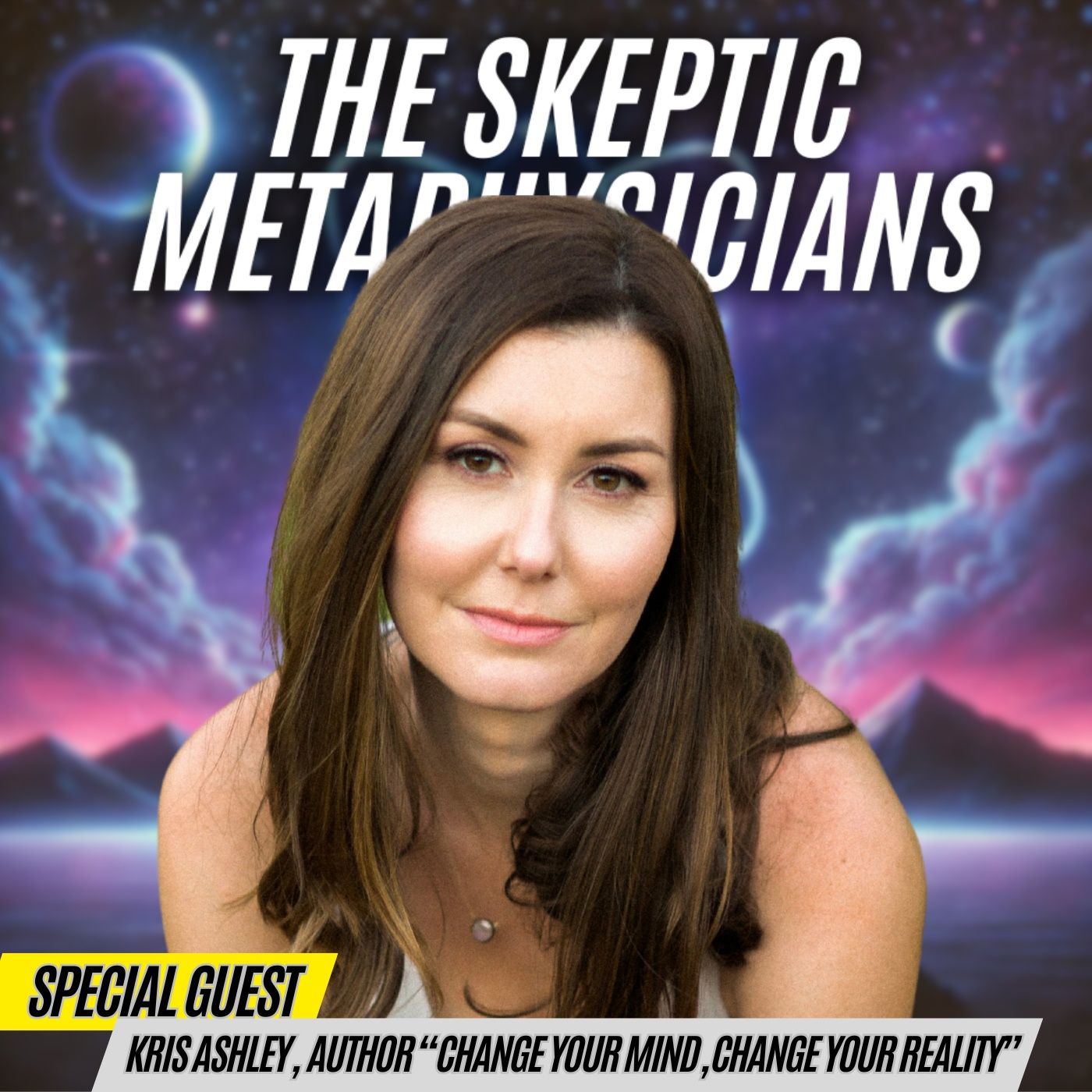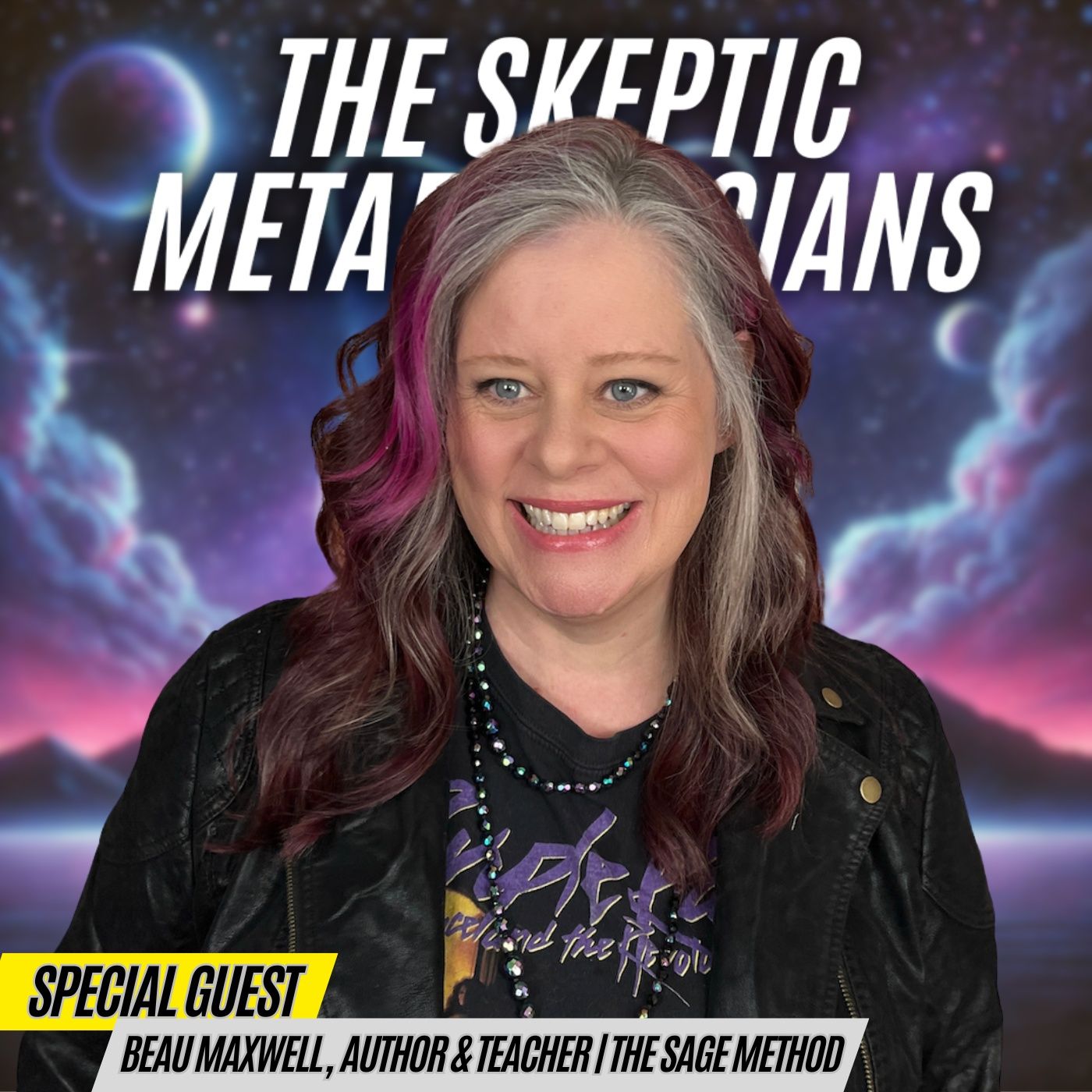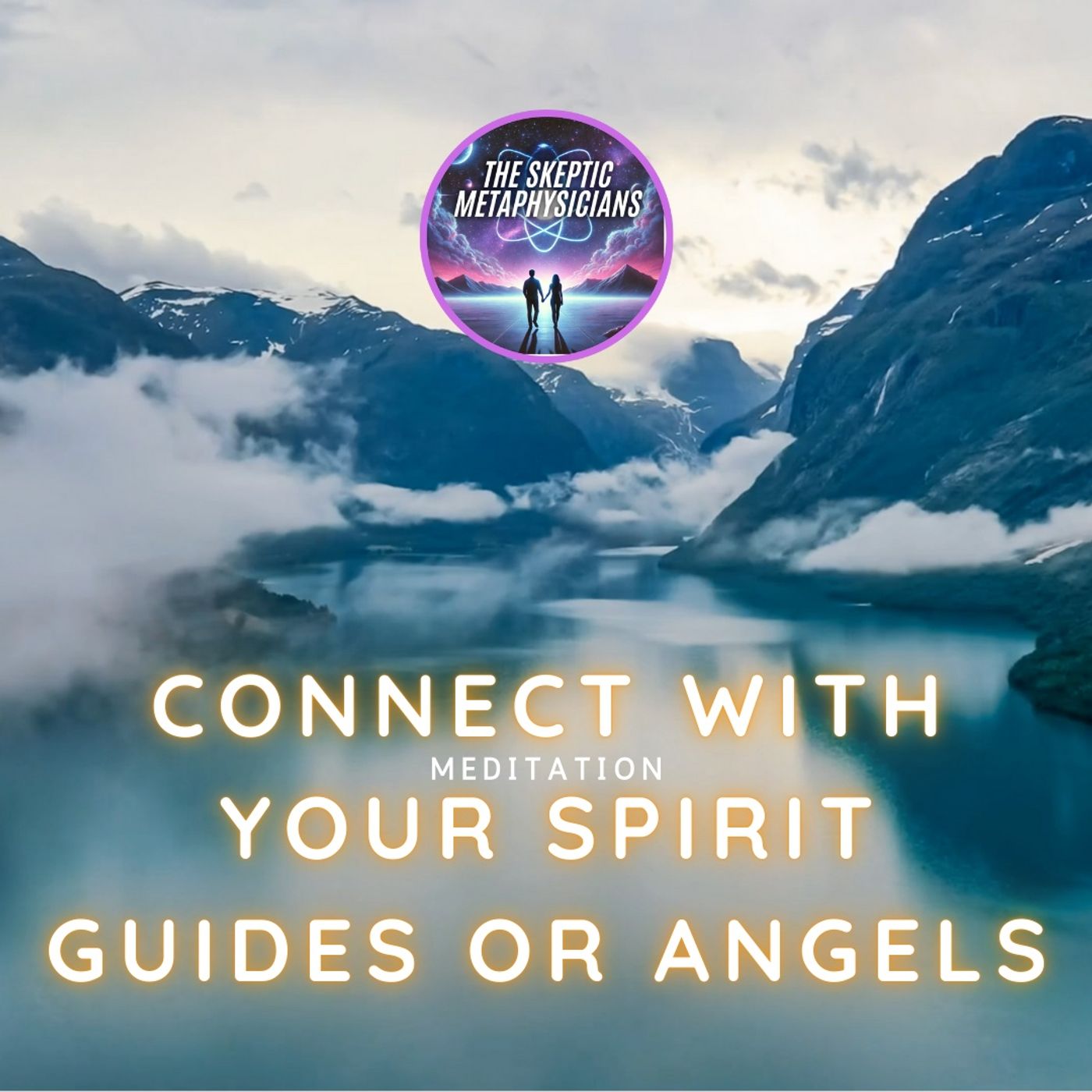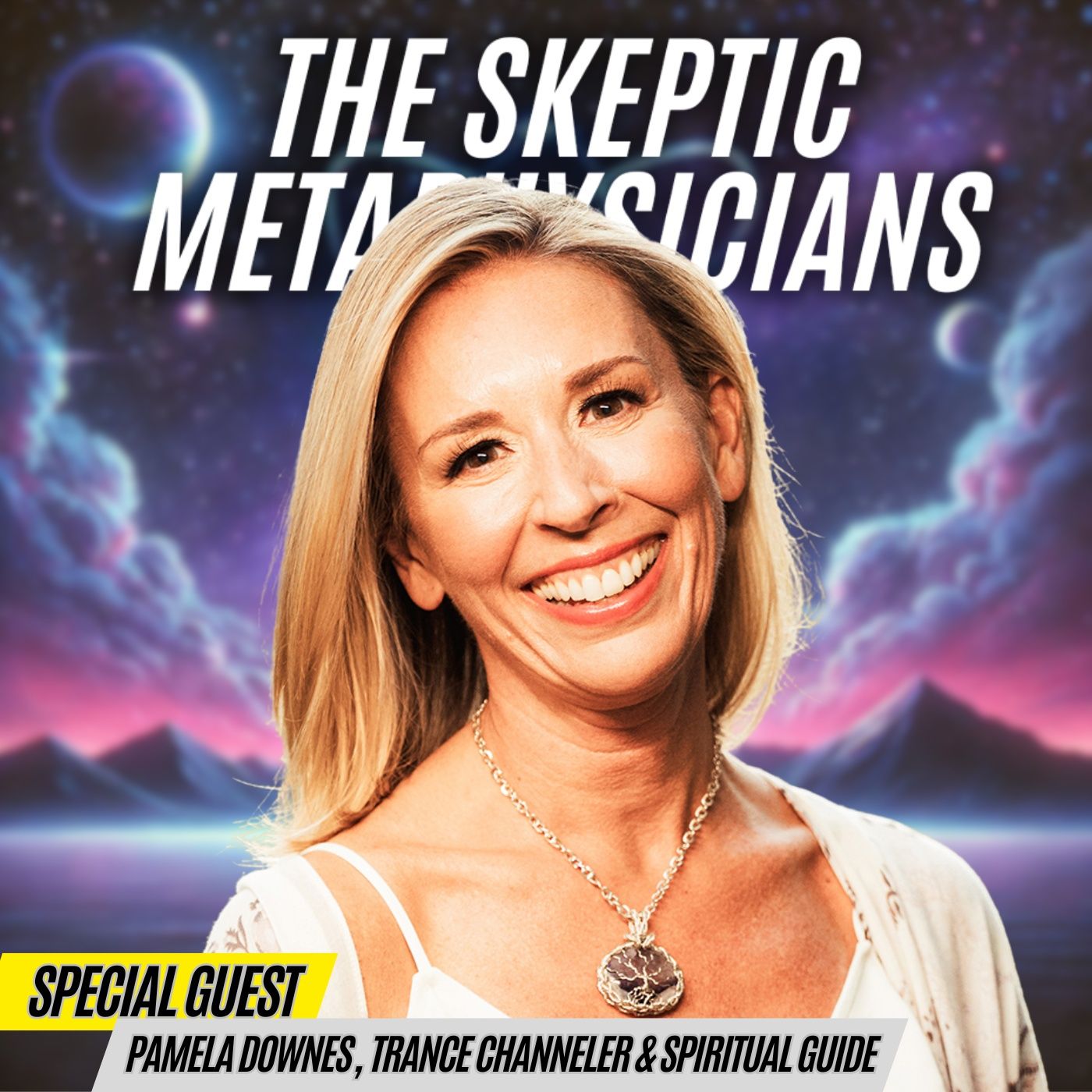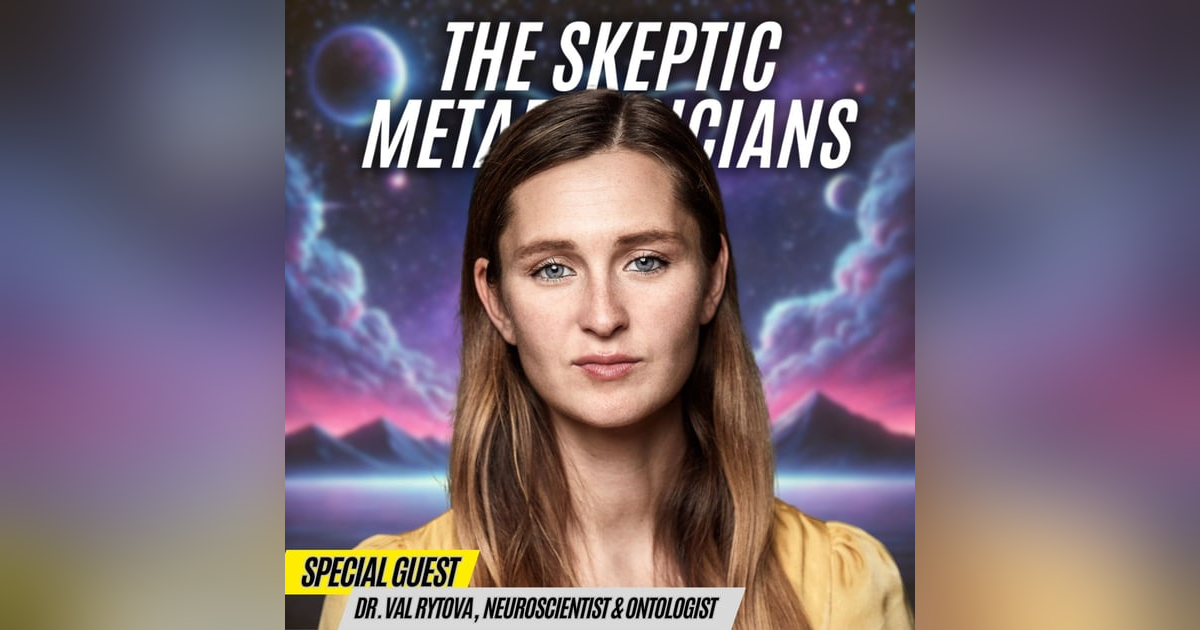
What does it really mean to be?
This week on The Skeptic Metaphysicians, we plunge headfirst into the cosmic rabbit hole with Dr. Val Rytova, a brilliant behavioral neuroscientist who fuses science and spirituality like it’s nobody’s business.
She’s got degrees in neuroscience, immunology, and anthropology, but don’t let the academic chops fool you—Dr. Val is here to talk about the metaphysical study of existence itself: Ontology.
From rewiring the brain and changing our DNA expression to navigating fear, awakening consciousness, and dancing with the mysteries of Being (with a capital B), this episode is the ultimate intersection of science, soul, and the slippery nature of time.
💥You’ll discover:
- What ontology really is—and why it matters for your spiritual path
- How neuroplasticity can reprogram fear, anxiety, and even catalyze spiritual awakenings
- Whether you can access past lives, parallel timelines, and higher dimensions (yes, really)
- How to make personal transformation stick using brain science
- Why conversations (yes, even awkward ones) might be the secret sauce of enlightenment
If you’ve ever stared at the stars while questioning your lactose intolerance—or just want to know who the heck you are and why you’re here—this episode is for you.
🧠🎧 Listen now and redefine what it means to BE.
🔗 Resources & Links Mentioned in This Episode:
🌐 Connect with Dr. Val Rytova:
Visit her official website for coaching, workshops, and neuroscience-meets-spirituality programs: 👉 https://www.drvalrytova.com
📱 Follow Dr. Val on Social Media: Stay up to date with her latest teachings, insights, and appearances:
- Instagram: @drvalrytova
- LinkedIn: Dr. Val Rytova
- YouTube: Dr. Val Rytova Channel
🎓 Programs & Courses:
Explore Dr. Val’s neuroscience-based spiritual programs and retreats (including info on neuroplasticity, rewiring fear, and living ontology): 👉 https://www.drvalrytova.com/programs
🌟 Tom Evans’ AUM Sanctuary (Affiliate)
Dive into Temporal Alchemy, Heart-Full Living, Channeling for Authors, and more in this incredible spiritual school. 🌐 Explore The Outer Sanctum by Tom Evans (Affiliate)
🎶 The Lovetuner (Affiliate)
Instantly reset your nervous system with the 528Hz love frequency. A wearable breathwork tool for calming stress and centering. 🛒 Tune into Love Here (Affiliate Link)
💡 Descript – AI Video & Audio Editing (Affiliate)
Edit podcasts & videos by editing text. Multi-cam editing, overdub your voice, remove filler words, and more. 🎬 Try Descript with Our Link (Affiliate)
- Hands of Light by Barbara Ann Brennan ➤ Grab the Book on Amazon
- The Untethered Soul by Michael A. Singer (referenced in the discussion) ➤ Find it on Amazon
- Quantum Healing Hypnosis Technique (QHHT): www.qhhtofficial.com
- NIH Epigenomics Program: www.nih.gov
- Andrew Newberg’s Neuroscience & Spirituality Research: www.andrewnewberg.com
🌎 Website – SkepticMetaphysician.com
📺 Watch the Video Version – Subscribe Here
📱 Follow Us on Social Media – Facebook | Instagram
📩 Join Our Community!
Get exclusive content & behind-the-scenes updates by signing up for our Inner Circle: https://station.page/skepticmetaphysician
Will & Karen: [00:00:00] Karen? Yes. You ever stared up in the sky and wondered, who am I? Oh, of course. I think everybody has. I, I mean, really wondered like in that deep.
Soul searching existential way where you're halfway through a tub of ice cream and questioning the universe even notices your lactose intolerant. No, I can one up the ice cream. I did it in the Sahara Desert. Looking up into like the blackness of the sky. You just ruined the joke here, Karen. Oh, I'm sorry.
Ice cream. Yeah. And I had my tub of ice cream in the desert. Oh, and you And, and wondering, questioning if the universe even notices your lactose intolerant. Yeah, I heard that. I worked really hard. That joke. I, I was kind of just trying to, right. Well, today's episode might just blow your mind because today we're talking about ontology.
Oh, that's right. Ontology. You know what that is? You know, I think, I think I used to know. It sounds very familiar. Well, it's, and I'm not confusing with Ornithology. I was just gonna say, not to be confused with Ornithology, unless you're contemplating the nature of being while watching birds see
[00:01:00] Ontology is the metaphysical study of existence itself. I was way wrong, but fear not. We've got someone here who can help us untangle this cosmic spaghetti. Dr. Val Rova is here to answer that question that's been burning in the back of your brain.
What does it really mean to be, and spoiler alert, it's probably not just about binge watching Netflix and forgetting your Amazon password, although I. Same. Now, Dr. Tuva is a brainiac in every sense of the word. She combines neuroscience, epigenetics, and metaphysical magic to help us understand the nature of reality.
Wow. And trust me, by the end of this episode, you'll either be enlightened, you'll at least be able to drop the word ontology at your next dinner party and sound like an absolute genius. So grab your favorite beverage, chai, tea, kombucha, or hay. That third cup of coffee, and let's dive into that big question.
What does it really mean to exist? Don't worry, [00:02:00] we'll ask the question so you don't have to awkwardly Google them later. The skeptic position starts now.
Will: Okay, real talk for a second. You ever feel like you've read every book, tried every method, watched every video, and still, still you're craving something deeper, something that actually works in your real life, but also speaks to your soul? Wow. Buckle up because we found it. It's called the aum, a beautifully immersive mystery [00:03:00] school created by our friend and mind.
Bendingly insightful guide Tom Evans and incite its portal of possibilities is a treasure trove known as a sanctum, the inner and the outer sanctums. See, this is where ancient wisdom meets wildly practical alchemy Where spiritual seekers and curious creatives alike can dive into an ever expanding universe of transformation. Now we're talking full on next level content like temporal alchemy. Master the Art of Bending Time to your will. Flavors of thought. You can rewire how you think on a soul level. There's also heartful living.
You can tap into a deeply aligned way of being. There's also the magic of numbers. Uncover the sacred codes all around you. There's channeling for authors. Yeah, channeling for writing. I. And meditations of transmutation, healing alchemy, abundant thinking, and so much more. There is so much inside the sanctums that in fact, Tom even includes a special [00:04:00] video just to help you navigate it all, which tells you everything you need to know about how power packed this space really is.
Now, if you're looking to stop dabbling and actually start transforming, well this my friend, this is your call to adventure.
And here's the coolest part. Tom has given us an exclusive affiliate link. So when you sign up through that, you're not just investing in your own evolution, you're also supporting the show and the work that we do here. So just head over to the show notes and you'll find the affiliate URL there laid in directly for you so you could find it and make it super easy. Karen and I we're already inside the aum.
Come join us.
Will & Karen: Hey there. I'm will. And I'm Karen. Our guest today is a powerhouse of knowledge and inspiration, seamlessly blending the worlds of neuroscience and spirituality. Dr. Val Rot Tova is a [00:05:00] behavioral neuroscientist with a PhD specializing in the brain mechanisms behind fear and anxiety related behaviors. With over seven years of studying and applying ontology, a profound sub branch of metaphysics, she's uniquely positioned to guide us in understanding the very essence of being.
Now as a self-proclaimed Neurosciencey Spiritualist, Dr. Reva's mission is to validate and empower teachers and healers collaborating to elevate the frequency of our planet. Through her transformative programs and workshops, she demystifies neuroscience concepts. making them clear, accessible and actionable.
Her work invites us to explore how rewiring our brains and altering our DNA expression can lead to profound life changes. A burning question she's here to address today. Get ready for an enlightening conversation that bridges the gap between science and spirit. Please join me in welcoming the [00:06:00] brilliant and inspiring Dr.
Val Reva to the show. Dr. Val, how you doing today?
Dr. Rytova: Hi. Thanks so much for having me. I'm doing great.
Will & Karen: Awesome. Awesome. Doctor. We are excited to be here because you study ontology, which means you know the answer to the burning question. The humankind has been asking themselves for eons. Right. The meaning of life.
Dr. Rytova: Yeah, look, I did. That's right. That's right. That's me.
Will & Karen: Okay. Awesome. So we're all ears.
Dr. Rytova: Oh, you wanna know now?
Will & Karen: I mean, no time left the present doc.
Dr. Rytova: Alright, no problem. Well look, having engaged in that subject of ontology, which as you said is the branch of metaphysics, that studies being with a capital B, I could tell you that the meaning of being or your existence is actually created moment by moment. Each second, each moment. I know time is a linear concept in our brain, [00:07:00] but it's not really linear.
Um, regardless, let's just stick to how our human brain. Perceives time and we'll just say it's linear for now. Um, but yeah, the study of being ontology is really gives you the opportunity to create your life moment by moment. And if you do it right, so to speak, you'll be able to do it free from the past.
Will & Karen: So then does that mean that the answer to the question we'll just ask is always changing?
Dr. Rytova: Correct. Just like ourselves, we're always evolving. It's always an interaction between us as you know, our physical beings, metaphysical beings, energetic beings, whatever beings. Huh? Beings with a capital B.
Will & Karen: I see what you do there.
Dr. Rytova: It, it's ever, it's ever changing. It really is ever changing. Nothing is set in stone.
Will & Karen: Hmm. Well then you are one of those, uh, rare breed of doctors or scientists that are okay living in the gray areas, right? [00:08:00] Because most scientists wouldn't accept an answer like that. Like, uh, uh, scientists need a. Definitive yes or no, black or white. Uh, something that is measurable and is repeatable. So you're talking about something that is by its, actual nature, not repeatable.
Dr. Rytova: Well.
Will & Karen: come to terms with that as a scientist?
Dr. Rytova: Yeah. Well, I like to live life on the edge, so to speak. You know, as and, and you're right, you're right. As a neuroscientist, as a scientist, I am very much, you know, my skillset is in the 3D, so to speak. Yeah. I like to look at every little molecule underlying whatever behavior and say, Hey, that's the molecule that causes this.
So yes, in that respect, I very much enjoyed that kind of pragmatic, um. Application of science. Not to say that as a scientist, I also know that whatever we say now, in 20 years [00:09:00] time in the world of science will likely be outdated. You know, people will say, Hey. What you said, or I will say, Hey, I reviewed this podcast that we did 20 years ago and you know what, everything I said was, was, um, is not the case today.
So I'm very much aware of that, of the nature of science in that respect too. As much as we'd like to attach ourselves to some sort of, um, certainty, I don't think certainty really exists in that sense. So we do live in an uncertain world, maybe. That there is certainty.
Will & Karen: Hmm. So like getting a definitive answer, that's not finite.
Dr. Rytova: Yeah.
Will & Karen: but is that really an answer then though, really, because it just brings more questions, right. Well, it's an answer for them in the moment. I. But the moment's going, they so it, it's so fun. Who is it? Michael Singer. Right? He in the, in the, in the book I'm reading right now.
He, he says, that moment is the moment you just, you're facing right now, that moment in front of you, but you turn to the left, there's a different [00:10:00] moment. Then you turn to the right, there's a different moment still, and then behind you. So there's moments. Are fleeting. And so that answer is fleeting. And how can you accept an answer that is so fleeting?
It's, but it's a slow fleeting, it's like a meandering.
This is tough, doc. This is really hard to wrap your mind around.
Dr. Rytova: Yeah, no, I'm, I'm with you. It took me a while to wrap my mind around that. I think every day, every morning, every second really, I have to, you know, force myself to get unattached from, Hey, I know this to be the case, and then bring curiosity to, Hey, maybe, I don't know. What this person's really like. I just think I know because of my neural pathways, you know, or whatever.
Will & Karen: So after spending time with researching and neuroscience, how did you branch off into this whole metaphysical realm?
Dr. Rytova: Well, I'm obsessed with human beings with a capital B. I don't know [00:11:00] where that came from, but I just am obsessed, like I did. I'm a nerd, right? So I've got lots and lots of degrees apart from the neuroscience degree. I've, I've got a degree in anthropology, um, immunology, like all sorts of stuff, you know, and I really.
Delved into the study of ontology based on being so interested in the human being, you know? So I've studied the behavior from a neuroscientific perspective. I've studied the, the history from that, you know, anthropology degree, so to speak. And then I was like, well, what about the being? What about the thing that we can't see?
That's between the lines. And I really got into that really, really.
Will & Karen: That's awesome. Wow. Well then how does the study of ontology help us to make sense of our connection with the universe then? Because this is, this is the big question, right? We, there's two big questions. What, why are we here and how are we connected? So we, dove as nebulously, as we did [00:12:00] with why are we here, but how are we connected to the universe?
How does ontology help us solve that problem?
Dr. Rytova: Yeah. Great. Well, if you. At, at a certain point through my experience or you know, study of ontology and more, more on an experiential level like ontology and we can talk about it like we are now. But then there's actually the in the living of your life, which I think a lot of ontology lives because it is about being so we are being, and it.
At a certain point, when you be enough in the present moment, you get to realize, or you get to experience that the being of me is exactly the same as the being of you, and we really are one another in a sense of being. There's no separation, so it's not like. You know, I didn't have to go through a psychedelic experience to experience that, but it's really through my delving into the the study of ontology where I [00:13:00] discovered that in the living of my life.
Will & Karen: So now you're, you're, you're diving deeply into quantum physics then, because that's a key concept of quantum physics, right? The, the entanglement, the connection of one.
Dr. Rytova: Yes. Yeah, well ontology is a branch of metaphysics, so I guess, yeah, the two go hand in hand. And I've had experiences, all sorts of experience where I really experienced myself not separate from, from any other being, so to speak, even visually. So, you know, you can go into all sorts of places.
Will & Karen: And and did you do that through meditation or, or in other ways? Meditation is what got you
there.
Dr. Rytova: Many different pathways. So meditations, um, weekend long retreats, uh, also in a con in, in the space of a conversational domain with other human beings like in conversation.
Will & Karen: So spontaneously you felt the connection while you were having a conversation with somebody.
Dr. Rytova: Yeah, and that, and well, we first had a [00:14:00] conversation and then allowed a pause and an opportunity just to just be with one another. And after a certain time, you know, there was no more separation and the experience was really what, well, here we are, you know? Or here, this is.
Will & Karen: You, you make it sound so matter of fact, but this is life changing, earth shattering, universe, spanning experiences that people in this space, I. Try to achieve on a regular basis, but fail to on a so, so what if it actually is matter of fact. But we have been conditioned and we've learned so many things throughout our lifetime and our, our ancestors and history that it's no longer a matter of fact.
Now it's like, ooh, you know, it's mind blowing. No, [00:15:00] I mean, I guess we live in a, we live in a 3D world, so it would be mind blowing though if it, if it's because we, we we're so separate from it. Well, we used to be, I think because I also have a degree in anthropology, so we have something in common
Dr. Rytova: Oh,
Will & Karen: Um, we used to have such more of a connection as we evolved to, to nature, to the earth.
So maybe at that time we had this. Knowledge and as we evolved and became interested in, you know, money and power and progress, that became the focus and everything else faded away. Mm-hmm. Because everyone says that we're all born with this, we just have to figure out how to tap into it, which would lead me to think it's, it's in our genes, sort so to speak.
Dr. Rytova: It is, it actually is. So just hold that thought. But it's, it's in our genes, in fact, and it's in our brains, in fact. But yes. Um, I can go on.
Will & Karen: yes, please, please do. Yes.
Dr. Rytova: Yeah. Yeah. So look, we are evolutionarily speaking, I mean, on a near scientific level, at a brain level and at a genetic level, [00:16:00] we are beings that are. Intricately supposed to be in nature, not in urban environments.
And over time, most of the time we actually have been up until very recent times, you know, where, I don't know, last a hundred years to a hundred years, maybe 50 years even. Um, but prior to that, we have really evolved to be in nature. And yeah, a lot of indigenous wisdom speaks to that, as you pointed out.
And, um, neuroscientific research, you know, epigenetic research, which is how our environment, in fact. Impacts our DNA expression. You know, depending on what environment you place yourself is what your DNA will express. So some of our DNA is so clumped up together and inaccessible until we go into nature spaces and really connect with nature and allow it to nurture us such that we express the parts of our DNA that couldn't be expressed otherwise.
Will & Karen: Mm. Well, that makes [00:17:00] sense because that explains why people go on these retreats or they have these experiences and it's never like, oh, I went to New York City and had this spiritual awakening. You know, it's always like, I went on a walkabout, or, you know, I went to Bali or something like that. I don't know.
When that guy held me up at gunpoint, I, I went in the heck of a spiritual awakening. I was praying for God. Like you had no idea, but
Dr. Rytova: Yes. I think it could happen in both ways actually. I think it can happen, you know, in, in New York, in a, in an apartment. It, I'm not opposed, I'm open to that. I'm just saying that evolutionarily speaking, our physiology and our brains and our DNA is predisposed to be in nature, and I think that's where we thrive and flourish, if you will.
Which is an artsy way of saying scientific things.
Will & Karen: We like artsy things. Uh, our two ways of putting things so that you work a lot with neuroplasticity and, uh, fear and anxieties is your specialty and things like that. [00:18:00] So how does that work into the metaphysics of things? How, why do we develop these fear-based program programs, um, that prevent us from being the best we can be?
If, if we are all that is.
Dr. Rytova: Yeah, I think you answered it yourself just before when you said it's the condition, the human condition that we are born into, predisposes us to that kind of. Brain wiring, physiological wiring, behavioral patterns as well. It's the condition of being human. If we're born into the condition of being a cat, it would be a different kind of, um, thing, you know, whereas of course, things like fear, survival modes, you know, the, a lot of people talk about the amygdala, the little red, but like that emotional circuitry is very much evolutionarily concerned between cats, rats, whatever species.
'cause we need it for survival. However. Right now, these days it's being overly used by us in [00:19:00] situations where, which don't really, where, where it's not required, you know, we're under constant threat, whereas whether real or imagined, whereas most of the time it's, it's not really there. It's not like you and I are running away from predators most of the time.
Yeah.
Will & Karen: Right, right. Uh, but the, the nine is young, so let's see.
Dr. Rytova: That's right. I mean, it's only morning here. I'm in Australia, so we'll see how the day
unfolds.
Will & Karen: you got a long, never say never.
Dr. Rytova: Yeah, yeah. Um, I dunno if that answered your question, but you can ask me it again and I'll probably answer it in a different way because it's a different moment.
Will & Karen: That's right. I was gonna say that. I think we're all on the same page. Yeah. We, we would've all said the same thing. Yeah. But, but then how can we, uh, utilize neuroplasticity to move away from those types of reactions?
Dr. Rytova: Yeah, perfect. So near plasticity, hot topic, right? These days, although it's a neuroscientist, I'm like, gosh. It's an old topic now, but regardless, [00:20:00] neuroplasticity
Will & Karen: it.
Dr. Rytova: is the capacity of your brain to rewire itself based on novel experience. Yeah. So if you've got this wiring, we're born into human condition where we're preconditioned from a young age to fear certain things.
Maybe it's, you know, family members or whatever, certain interactions, certain relationships. You can actually rewire your brain by Yeah, uncle John, by placing yourself in a novel environment to actually retrain your brain to create new neural pathways, um, yeah. To, to alter behavior. That's how you effectively, that's how you do it.
And there's no 21 day habit thing that's gonna, it's that, that's a myth by the way.
Will & Karen: gonna ask you that I'm, you have to do it for 20, 21 days. Is it 66 days?
Dr. Rytova: It's really, yeah, no, let's not bring numerology into this, but it's, it's as well we can, but yeah. Um, it's not actually, there's not a set amount of time. It's very much a, um, [00:21:00] an individual experience, how long it will take you to rewire your brain. For some people, it could take a moment for other people who could take a lifetime, you see?
So it really, it does depend on your environment. The fastest way to do it is to alter your environment. So if you alter your environment that's now conducive of your new behavior, your new neural pathways that you have formed, um, that's probably the most effective way
Will & Karen: So what you're saying is you should go on a retreat for 21 days and that is gonna make you change, right? But not necessarily 21 days. Well, 66 days, whatever the number is, right? But you should go on an impactful retreat,
but.
Dr. Rytova: I'm not necessarily, you know what I'm actually saying is if you go on that retreat with a bunch of people that you know, and then those people keep hanging around you after the retreat, that will make it stick. 'cause then you'll all be speaking the same language that you learn
Will & Karen: Oh, interesting. Okay. Gotcha. So, so it's really, [00:22:00] it's, it's about continuing the pattern that you started in a conducive environment, bringing that environment then with you, mentally. That's interesting. Okay.
Dr. Rytova: Yeah. And it could be a con, it could be a conversational environment, you know, you learn some new things and then you're all in that conversation together forwarding whatever it is that you discovered. Or, or, or actually, physical environment, I mean, whatever environment. Yeah.
Will & Karen: And then I think if you're having good results, even if just the com conversations are stimulating or whatever, you're gonna wanna continue that. So it's not even about the 21 days, it's about seeing it and enjoying it, and you just become it. Mm. All the more reasons we have to start the new reality.
Retreats. Absolutely. Okay. Anyway, so then let's flip it then. Let's talk about neuroplasticity since we can do that, to remove fear and anxiety and all that kind of stuff. Then can you use that for spiritual awakenings instead?
Dr. Rytova: Yeah, spiritual awakenings from the point of view in neuroscience is a novel [00:23:00] brain pathway that's now, you know, been formed or formulated by the brain, you know, whereas before it was some other wiring, fur related wiring, but wow, you've had this. Everybody go, goes through the awakening process in a different way, right?
However they get to that, it's different. But let's say, oh, I did the spiritual retreat. I've now opened up this neuro pathway for awakening, and, um, I wanna train that pathway. So when to use it more and more, and more. That's how neuroplasticity works. The more you use the pathway, the more likely it'll be the go-to pathway used by your brain.
Okay. So yeah, you can either review the retreat or, or, or en engage in those kinds of practices, if you will, that will allow for that awakening to to, to be.
Will & Karen: Okay, so then you go on this retreat and you go with 10 of your closest friends, and you all live together and you're living and breathing and eating [00:24:00] together constantly out in the retreat. And then you leave and you are constantly, you're, you're in it, uh, and you're reinforcing. The thought patterns and those, uh, neuropathways that you have opened up in the retreat centers and things like that.
But you leave because you've gotta go to work, and then after that you've gotta go pick up the kid and then you gotta make dinner for the family. And then this, so then you, you're not using the neuropathways. So is it, how constant do you have to be in those neuropathways to keep them going? Or can you, we live in a 3D world, right?
So. Like, can you do it a day then not again for a week, and then come back to it a day and or two and then go back to the 3D world? Mm-hmm. Or how much do you have to be in it?
Will: We need to take a quick pause, but we'll be right back right after these messages.
Will: Okay. Real talk life. Is a lot. I mean, between working full-time, producing the skeptic metas, launching new reality [00:25:00] TV and trying to be halfway decent parent, sometimes I feel like I'm running on coffee vibes and sheer stubbornness. And look, I'm not proud of this, but when I hit that wall, my nerves while they get crispy, like burnt toast in a meditation circle kind of crispy.
But then I remember my secret weapon. My little magical flute of calm, my love tuner. Yep. It's basically a necklace that you blow into, but not just any necklace. This baby emits a 528 hertz frequency, also known as the love frequency. I. A few breaths through it and boom, instant reset. It's like my stress just packs it bags and goes on a silent retreat in Sedona.
Seriously, it helps me recenter, quiet the chaos, and feel like myself again. And who wouldn't want a portable pocket of peace? Well, if you're curious, check out the link in our show notes when you buy through [00:26:00] that special link. Not only will you be doing something good for your nervous system. You'll be helping support the show too, because we get a small affiliate fee with it.
So go ahead, tune into love, and maybe save your own sanity in the process.
And now back to the show.
Will & Karen: Like, can you do it a day then not again for a week, and then come back to it a day and or two and then go back to the 3D world? Mm-hmm. Or how much do you have to be in it?
Dr. Rytova: I think, I mean, look, I think you can, but that would defeat the purpose of the learnings. You know, you wanna integrate them into your life. So whether and what, however you do that, I think is up to you. Like, you know, if you're a neuro neuroscientist like me, you like to have a pop-up thing in a calendar that says.
Are you doing the practice or what are you doing?
Will & Karen: So, so like like on a daily
Dr. Rytova: like Yeah, on a daily basis. Like, I literally have popups in my calendar that pop up and so, and say, um, are you, like, what kind of conversation are you engaged in now? [00:27:00] Then I'm like, oh yeah, I'm just, I'm making someone wrong.
Will & Karen: yeah.
Dr. Rytova: You know, like just, but to actually spark that, like the, the, the neural pathway again, you know, to,
Will & Karen: off my back. Siri, shut up Alexa.
Dr. Rytova: Yeah, and however you do that, that's up to you. Certain people, you know, choose to move countries or, you know, go and live with this within certain communities or, you know, you even move to certain neighborhood that's more aligned with your process. I think it depends on what you're sort of into. I think that's the beauty of, of being human.
Will & Karen: what I'm hearing is that you can't really half-ass it, right? You, you really gotta be committed to it, otherwise you're not gonna make any significant change. So it's not like muscle memory.
Dr. Rytova: Correct. Well, in a way, look, it depends 'cause it can be like muscle memory. The [00:28:00] thing with the, okay, so the thing with experiencing with neuroplasticity, if you pair it with an emotion. The memory will last. That's the whole basis of things like PTSD, you know, but also with the, of really joyful experiences in life.
You know, you really remember that really happy memory because it was associated with such a strong emotion of joy. So if you pair a memory with a strong emotion of joy or whatever emotion you prefer, um, it'll, it'll last. It'll stick.
Will & Karen: Oh, I like that. Well, you, you're trying to remember something, aren't you?
All right. Okay. Well that, so. Uh, and the reason why I bring that up is because there's a lot of armchair spiritualists out there that they meditate every day and, uh, they don't do anything else, but they are on their spiritual journey. I'm one of them. I'm a self-proclaimed spiritualist, right? My, I am on a spiritual journey, but all I do.
[00:29:00] Is meditate. I mean, I read books here and there. I listen to podcasts. I do the show. I run a, a streaming network of shows in this kind of thing and right. I, I'm in it, but I don't really live it. Right? I don't have the conversations. I don't surround myself with like-minded people a lot. I don't, uh, I don't surround myself all the time.
I am in the 3D world. I have a, a, a, a job that is outside of the scope altogether.
Dr. Rytova: Yep.
Will & Karen: So it's difficult for me for things to stick. I've been talking for four years about wanting to astral project, but I don't do anything to make it happen.
Dr. Rytova: Yeah.
Will & Karen: what I'm hearing you say is, I am out of luck because I'm just not putting in the work.
Right.
Dr. Rytova: Um. Yeah.
I hate to just point it alive, but yeah, [00:30:00] you gotta really, you gotta really throw your head over the wall and jump into it and, you know, let loose and discover something. It's through discovery again. You know, where that, where things will stick. That's, so the, the link to ontological research between neuro neuroplasticity and ontology is the discovery.
A lot of on ontological stuff is. As I said before, through life, through the experience of it, it's an, it's experiential in nature, it's existential in nature, so you living it is what will have at stick because it's also through discovery and discovering something's very exciting. So,
Will & Karen: well we, we have a kind of like the, a different, I don't know, type of awakening. We, we've, we've had, I dunno, how many hundred interviews have we had now? Uh, 200. 200. Over 200. We've released 200. Um, so a lot, and we've talked to people in all different paths of life, all different levels of spiritual awakenings, and we have talked to several people that have said, well, I was in a car accident and then I [00:31:00] started hearing voices and I realized it wasn't voices or just, I've always been like this, or all of a sudden one day this happened and they're not doing anything.
And I think that's where your frustration lies because they didn't have to do the work. Is there a difference in someone who has. That type of spiritual awakening then, I guess in, in the brain than someone who has to work for it. Like is is one, I don't wanna say better or stronger or more connected than another.
Dr. Rytova: I don't think one's better, you know, or stronger or anything than the other. They're just different experiences that cause the same results. So neuroplasticity, the formation of new neural pathways such as awakening, which is a new neural pathway. On a 3D neuroscience level, um, that can be caused through an event, like a near death experience, or it can be caused willingly by you actually immersing yourself in an environment that is conducive of that awakening.
Like, you [00:32:00] know, people go on Ayahuasca retreats and they see things they haven't seen before, and they're like, whoa, there's there. I'm never saying, you know, I've seen things that really have, you know, and, and, and like that, right? But then it, they cause that, like, for whatever reason, you know, I'm not gonna go into the, the, the, the reason behind it.
Whether they were soul searching, whatever, they went there, they did that. But it was like, it was an action taken from, from, from a will, from a will. Like, I, I went there and I did that, versus I was in a car accident and you know, now I have guardian angels, and angels and spirit guides talking to me all day long.
And, you know, they just won't shut up. So I have to do what they say. It's, it's like, it's, it's different. It's different. One's not better than the other. It's just different.
Will & Karen: So really, a way of life, right? It's a, decision that you make to, To follow and it, it's not necessarily a bad thing. If you have one foot in one foot out, it's perfectly okay if that's what I mean. If that's what you're after, I am [00:33:00] after a deeper connection and I.
I just need to take more action in order to get a deeper connection. It's like the commercials we were watching today, there's all these commercials for weight loss. Take this shot and you'll lose all this weight. You want the shot. 'cause it's like, oh, you take the shot, you lose all this weight. Or you could, you know, eat healthy and maybe exercise.
But it's that wanting the fast. You know, to fast track it, that instant gratification, well, you know, they got that shot for weight loss. Now maybe they have several, but then did you see the side effects? Maybe tomorrow they'll have a shot for spiritual awakening. You never know. Well, you never know. That would be kind of cool.
I might actually take that shot.
Dr. Rytova: I don't know, but yeah.
Will & Karen: well then let's, get back to, your profession, right. Neuroscience, because it is fascinating to me. Mm-hmm. We've had someone who studies a brain before and he measured the brainwave activity of a healer in a psychic while, she was performing cer certain things. So she says channeling, right?
[00:34:00] Mm-hmm. So when, in your studies have, or have you heard of any, concrete, studies where, spiritual experiences have been validated through, uh, scientific means?
Dr. Rytova: not in my personal studies, but yeah, I've seen studies like that. I mean, there's a lot of studies, you know, on meditation, things like that. But as you say, people channeling where there's this one guy, Newberg is his last name, he's a scientist that studies people that lead certain lifetimes. Like he studies the brains of.
Tibetan monks, and then he goes and looks at, um, nuns, you know, how, who lead a particular lifestyle, right? Like, so the, those studies definitely have been done. And yeah, there's brain alterations in people that, um, engage in those kinds of, um, behaviors, I'll say as a neuroscientist. Yeah. Whether it's a psychic channeling behavior or, or you know, or meditation behavior or where are you accessing.[00:35:00]
Other realms, um, or astral projecting. There's definitely studies out there for sure. And you know, one, um, oh, what's that book? Hands of Lie, right by Barbara something. She used to be a NASA physicist. I mean, she's dead now, but in the physical realm. But you know, she.
Will & Karen: She's transitioned, doctor. She's
Dr. Rytova: Boring. Maybe, I don't know. Maybe she's sitting right there, but I can't see her.
But ultimately maybe I'm, I'm, I'm channeling her right now. I'm kidding. But listen. But no, actually the book is incredible 'cause she's a, not, she's a very 3D person, right? 3D NASA physicist that started to see auras and started healing people through the quantum field and became like a really, really, really great practitioner.
And, um. Yeah. So the more I delve into that book, the more studies like you say, I read in her research. So yeah, they exist, they're there. And for sure, I'm a believer that everything comes from, from the etheric [00:36:00] field before it's in the physical. It's not physical out, it's the other way in.
Will & Karen: you were kind of joking, maybe she's right here. what is your take on ghosts or spirits coming to visit? Is it a real thing or do you like, do you, how would you explain that?
Dr. Rytova: I think well through the, I can't explain it scientifically. Again, it would have to be exper, I think, through the lam realm of ontology. Metaphysics through the study of being. But yeah, when a physical thing disappears, the thing that's. There, still there, you know, without the physical beer. And so whether you call it a ghost or a spirit or an entity or whatever, right?
The, the, the, the being is still there, just not in their physical form. And of course there are limited capacity for seeing those things. I'm not saying we all limited, 'cause as you said, there's people that see people like that.
Will & Karen: Hmm mm-hmm.
Dr. Rytova: yeah, that's my take on it, is just that they're [00:37:00] there without their physical appearance.
Will & Karen: Right. Energy can't be destroyed. It can only be transformed. Right.
Dr. Rytova: Correct.
Will & Karen: Yeah. So then if that's the case, there is a huge, a big conversation piece going these days that that's peripheral, but not really having to do with it. But I'm really just curious what your thoughts in the whole UAP phenomenon, the whole disclosure thing, what, what is the neuroscientists view on the UFO phenomenon?
Dr. Rytova: My view personally as a neuroscientist, as a spiritual neuroscientist is, yeah, of course. There's things that, I mean, gosh, if we think we're the only things, living things in the universe, I think that's a very skewed view of life. That's my personal view. I mean, gosh, like. You look at the amount of stars go, going back to the side of this conversation, when you're there and you're looking at the stars, if you think this like 8 billion of us is the only thing that exists, viably, oh, I don't know.
I'm, I'm not with that. I'm not with
that.
Will & Karen: Right. [00:38:00] But also in the beginning of the conversation, you talked about time being a construct and not being linear. So if time is a construct, can we use neuroplasticity or, or some sort of, brain training techniques to access like past lives and parallel dimensions and things like that. Is that possible?
Dr. Rytova: Yeah, of course. I mean, people do do that, like quantum healers and quantum hypnosis, like attempts to do that. I don't know if you, I've had a past life regression and I definitely went back in time and I was like a dude and one of them and a woman in the others, you know, and it was happening all right.
Now I was like, when is this happening? It's happening now. So it's all happening at once, but the capacity of our brain. Most of the time is this linear fashion, whereas in fact, there are experiences, there are practitioners that can allow your brain to expand in a way that you can actually perceive different times at once.
That's That's what I think. Yeah.
Will & Karen: and, that's my, so the way that I explained it to someone, the other, the other day is that time is [00:39:00] happening at one time. All time is happening simultaneously. It's just our brain can only process it in a linear fashion. So that's why we are experiencing it that way. I, if we were to remove our brain function and be able to experience existence, we would be experiencing all time at one moment, and that would be. You know how, you put a something in a microwave and it just like pops. That would be us. That would be our, our heads because we wouldn't Right. Yeah. We wouldn't be able to process it. So that's how I see it. Makes sense. It's a deep thought. Right. And I think it's also easier for people to fixate on the linear, because our bodies change in a linear matter.
It's not like. Tomorrow I feel kind of young and spray. I'm just like, huh. Getting older and you just kind of watch your body progress in a linear way. So it's kind of, we attach ourselves to that. Right.
Dr. Rytova: Yeah, we're attached to the physical, which as I said, it's not a bad [00:40:00] or a good thing. It's just, I think the reality of it is as long as we know, it's just how our brain perceives time. It's not really what's so, it's a powerful place to stand.
Will & Karen: So you help people with, overcoming anxiety and fear based, uh, thought processes and things like that. How do you go about it as a, as a spiritual neuroscientist? How do you help people get through those things?
Dr. Rytova: Yeah, well in conversation really, I think. Um. To a certain extent. To a certain extent, knowledge is power. So provide people clarity about their brain. You know, just like you said, Hey, our brain perceives time in this way, but it's not really like that. It's kind of the kind of conversation I have with people is, listen, this is what's happening to you on a brain level.
The fact that you think there's a, you there is just a neuronal loop firing over and over again. You know, somebody calls you vow that many times in life, you really think there's a vow there, but there's not. It's just a neural pattern, just like every other behavior. So I think once people get the. You know, the, the, [00:41:00] the neural basis of things, which is pretty like 3D simple.
The charge is taken out of all the other stuff, and people find freedom in that, if you will, you know.
Will & Karen: You make it sound so simple. Just yeah, just take it out. It's good. Uh, I'm sure that's a lot more complicated than that. but like, so then if, if I'm not Will,
who am I?
Dr. Rytova: well, you're, you're no thing. But also everything all at once.
Will & Karen: That's, that's not helpful. That's, but it would explain your mood swings.
Dr. Rytova: discover that you've gotta, that's because I just told you it right? You, when you discover that for yourself, and there may have been times where you really did discover it in that moment, that was profound. But us talking about that now, of course, isn't helpful. You've gotta go out and experience that for yourself.
And how you do that is totally up to you.
Will & Karen: So are we, [00:42:00] and this is a question that, that people have asked through the ages in, in, in this space especially, but are we. The thoughts in our mind? Are we the bodies we inhabit? Are we the, observer behind the thoughts? Who, what? Exactly. And we're back to ontology, right? Who are we, what is, when we're the study of human beings, what is a human being?
I don't know how to ask the question. Like, who, who
Dr. Rytova: fair enough. Fair enough. I think, you know, we're from the start, we're nothing literally blank space and then some energy. Behind that well starts to formulate maybe from that, from that nothing. And then eventually you enter the human conditioning and you start to formulate those loops and neuronal patterns and behaviors and the conditioning that makes you who you are [00:43:00] today.
But at at an essential level, you're really nothing. There's nothing there. It's just like the bunch of conditioning that has made you who you think you now are.
Will & Karen: So then when you die, you go back to being nothing.
Dr. Rytova: I think you're, you know, no, I don't necessarily think you go back to being nothing. I think you just continue on the journey, not in the physical form.
Will & Karen: So then what about reincarnation?
Dr. Rytova: Sure. Well, then you get into the body. Yeah.
Will & Karen: So then how long ago were we? Nothing.
Dr. Rytova: Uh, it depends on the, on the soul. Maybe. It depends on your soul. I mean, I've been around so many times. I think I've lost count.
Will & Karen: so, so there, there was a point where we were nothing and, but may, it could have been a long, long, long time ago. It's not that we were always in existence. We, we weren't always were, we weren't always there.
Dr. Rytova: Yeah, I think there is a starting point to it before which we, there was nothing. [00:44:00] No thing. That's my personal kind of view. Yeah. Maybe a bowl of energy and then at some point, well, we're still a bowl of en bowl. We're not even a bowl, but an energetic being, I don't know, an energy, we're in energy in a physical form.
Um, yeah.
Will & Karen: So then where does consciousness come from?
Dr. Rytova: Ah,
yeah, well, if we're one consciousness, you know, experiencing itself in whatever form, then we're just part of that. And at some point the consciousness became aware of that. It's conscious.
Will & Karen: Oh, this is tricky.
Dr. Rytova: It is trippy because of a human brain. Like we're actually, there's things that the human brain cannot understand language at all, and I think this is one of those things for now, I'm not saying forever, but for now it's very difficult for us to actually explain these things. Maybe that's why it's better to just experience them.
Will & Karen: That's a good point. So, so how would you suggest one [00:45:00] experience It?
if I wanted to experience it, do I, do I reach out to you and we. We connect and you help me get there? Or is there other ways you meditate every day or, I mean, which I already do, but I don't get there, so how can I
Dr. Rytova: Mm-hmm. I think it depends on the, it's really depends on the person. Yeah. You can work with someone like myself or other people, you know, some people like, you know, to reach out to energetic healers or shamans, you know, that's kind of whatever you're into really. Or it could be a personal discovery, um, through.
I don't know. Maybe you'll go and live in the forest for 20 years and discover that for yourself. It's really, that's really up to you.
Will & Karen: Right.
Dr. Rytova: Yes. No,
Will & Karen: no,
that's naked and afraid. Oh.
Dr. Rytova: I think it really depends on the person. That's the beauty of human existence. You can choose. You can really choose and explore that for yourself, and if there is a will, there's a way.
I know it's a cliche thing to say, but I think so.
Will & Karen: [00:46:00] He tells me that all the time. Yes. Especially 'cause I'm always there. Yes.
Dr. Rytova: Oh,
Will & Karen: And his name is Will and there's always a way.
Dr. Rytova: oh, yes, yes. And I'm with you now.
Will & Karen: Alright. Wow. Uh, well, uh, doctor, if someone wanted to reach out to you to work with you, uh, what's the best way for someone to reach out?
Dr. Rytova: via my website, ww dr val rva.com.
Will & Karen: All right, well, we're gonna add a direct link to, that website on our show notes as well. So if you wanted to connect with Dr. Val, just go to s skeptic me.com. if you prefer, just so you can just click on a link and you have complete access to her immediately. Is there anything that we haven't touched on you wanna make sure that you mentioned, before we close out?
Dr. Rytova: No, I think we've explored, um, enough for the human brain to, for now
Will & Karen: For now. Yes. I might not sleep tonight, but you know.
Dr. Rytova: then you should reach out to me by my.
Will & Karen: [00:47:00] Yes, yes. I may just do that, but, alright, Dr. Val, thank you so much for being on the show. This was absolutely fascinating. Yeah. Um, I, I think I am, I'm had some coffee and I probably shouldn't have, I probably should maybe go and, Find an Ayahuasca retreat or something to try to process some of this stuff.
But, uh, it's, it's been a great conversation. We really, uh, appreciate you having you on the show. Thank
you.
Dr. Rytova: Oh, my pleasure. Thank you.
Will: Hey there, it's Will. Just stepping in here for a second to ask you for a favor. See, the main reason we do this show is to help others in their spiritual awakening, and nothing makes us happier than to hear or read messages from those that are resonating with the messages we're sharing on the show. So if you have a moment, we'd love for you to contribute to the show by heading to skeptic me physician.com and sending us a voicemail or an email.
From our website, or if you prefer, we'd love for you to leave us a review on Apple Podcasts or any other podcasting [00:48:00] platform that supports them. Karen and I love hearing from those that are moved to message us. It truly does fuel our passion. You are the reason we do this show and knowing what you like and don't like really gonna help us craft the very best show we can so that we can help raise the vibration of the planet together.
Thanks for listening.
Will: I gotta be honest. Editing video used to make me want to crawl under a desk and hide, but then I tried D script and everything changed. The first time I used it, I was working on a full length interview and we'd recorded with multiple camera angles.
Uh, normally that would have meant hours of manually cutting back and forth between the shots, right? But with D Script, I literally dropped the footage in, click the button, and it automatically switched cameras for me based on who was talking it. It started off with me full screen. Then it went to a two box where I interviewed our guest, and then when our guest was talking, [00:49:00] the guest went full screen, and after a while, it switched back to me for a reaction shot before it went back to my guest full screen.
It was incredible. I mean, I just sat there blinking at the screen like, wait. Did it seriously? Just do that total game changer, and that's just one of the cool things it does. I mean, you can edit your audio and video by editing the transcript itself, like it's a Word document. I just delete a word and poof.
It's gone from the video too. Oh, I forgot to say something in the middle of my recording one time. No problem. I just typed it in and let overdub. say it in my own voice. Creepy. A little cool. Very. D Script also removes filler words. It cleans up your audio with studio sound. It adds captions, makes audiograms, uh, puts in lower thirds and can even publish your content straight to the web directly from the platform.
If you are a creator of any kind, this is the tool that will save you time, headaches, and [00:50:00] probably. Well, a few strands of air. There's a special affiliate link in the show notes. Click it to check out DS script. You'll be doing your content a favor and helping to support the show at the same time.

Dr. Val Rytova is a behavioural neuroscientist, passionate about empowering people to have clarity about their brain. With a PhD focusing specifically on brain mechanisms underlying fear-related and anxiety-related behaviour, her expertise is a great asset to exploring your reality through neuroscience. She currently runs programs and workshops making Neuroscience concepts clear and easy to grasp. She is a mother, and an avid kitesurfer. If you're curious about the power of your brain and the impact of your daily habits on your brain, you can find Dr. Val @love_of_brain on Instagram or go to www.drvalrytova.com and connect!
noun
noun: ontology; plural noun: ontologies
1.
the branch of metaphysics dealing with the nature of being.
2.
a set of concepts and categories in a subject area or domain that shows their properties and the relations between them.
"what's new about our ontology is that it is created automatically from large datasets"
